Analysis of Psychological Risk Management Avoidance in Projects
VerifiedAdded on 2023/06/07
|30
|6607
|321
Report
AI Summary
This report explores the psychology of risk management avoidance in project management, focusing on how psychological factors influence risk perception and decision-making. It presents findings from a survey analyzing the awareness of psychological risks, the role of cognitive biases, and the impact of self-confidence and stress on project managers' operations. The results indicate that while many respondents are aware of psychological risks, these risks are often not formally identified within project management organizations. The study also examines how teamwork, employee mentality, and project manager policies can mitigate psychological risks, providing statistical representations and descriptive analyses of the survey data. Desklib offers a platform to access this and many other solved assignments for students.
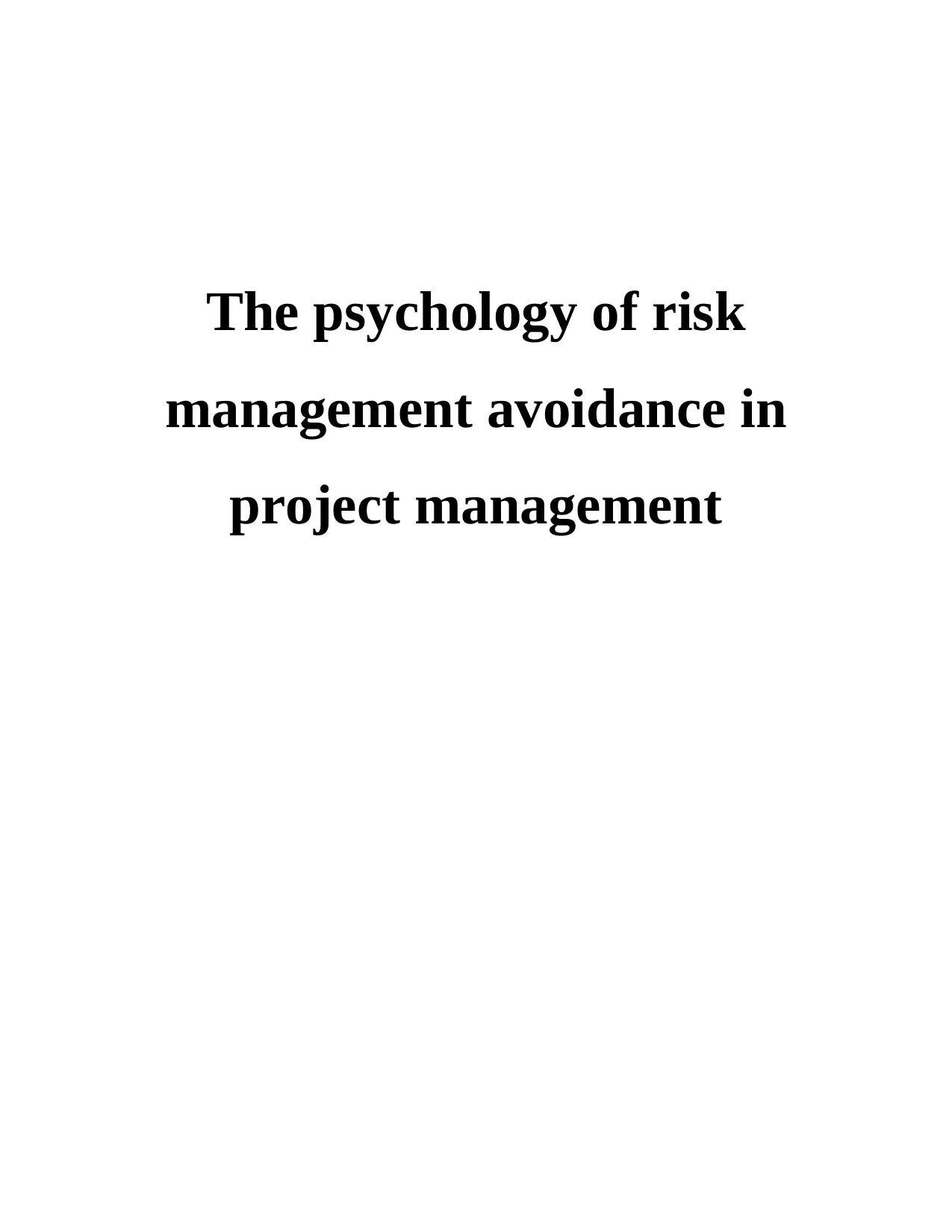
The psychology of risk
management avoidance in
project management
management avoidance in
project management
Paraphrase This Document
Need a fresh take? Get an instant paraphrase of this document with our AI Paraphraser
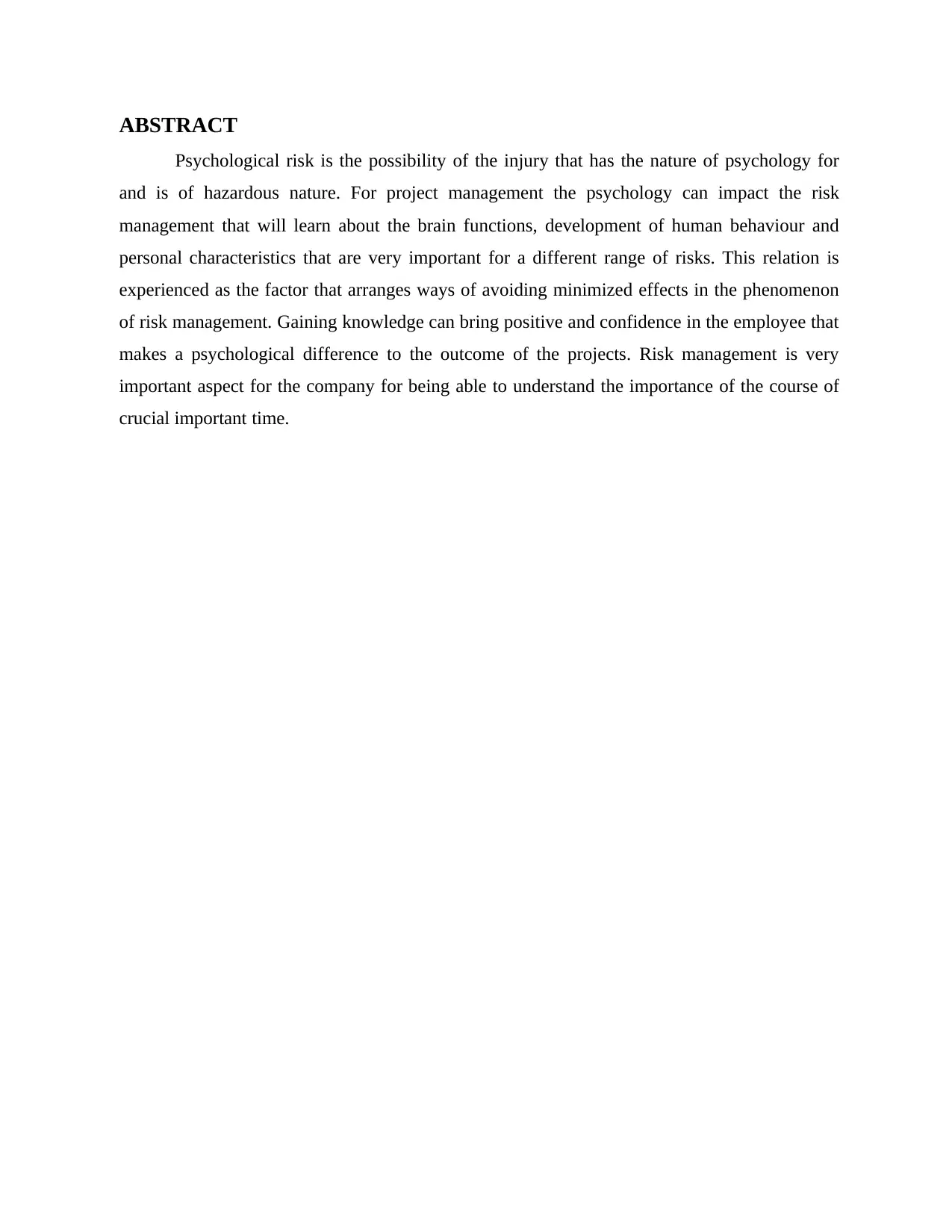
ABSTRACT
Psychological risk is the possibility of the injury that has the nature of psychology for
and is of hazardous nature. For project management the psychology can impact the risk
management that will learn about the brain functions, development of human behaviour and
personal characteristics that are very important for a different range of risks. This relation is
experienced as the factor that arranges ways of avoiding minimized effects in the phenomenon
of risk management. Gaining knowledge can bring positive and confidence in the employee that
makes a psychological difference to the outcome of the projects. Risk management is very
important aspect for the company for being able to understand the importance of the course of
crucial important time.
Psychological risk is the possibility of the injury that has the nature of psychology for
and is of hazardous nature. For project management the psychology can impact the risk
management that will learn about the brain functions, development of human behaviour and
personal characteristics that are very important for a different range of risks. This relation is
experienced as the factor that arranges ways of avoiding minimized effects in the phenomenon
of risk management. Gaining knowledge can bring positive and confidence in the employee that
makes a psychological difference to the outcome of the projects. Risk management is very
important aspect for the company for being able to understand the importance of the course of
crucial important time.
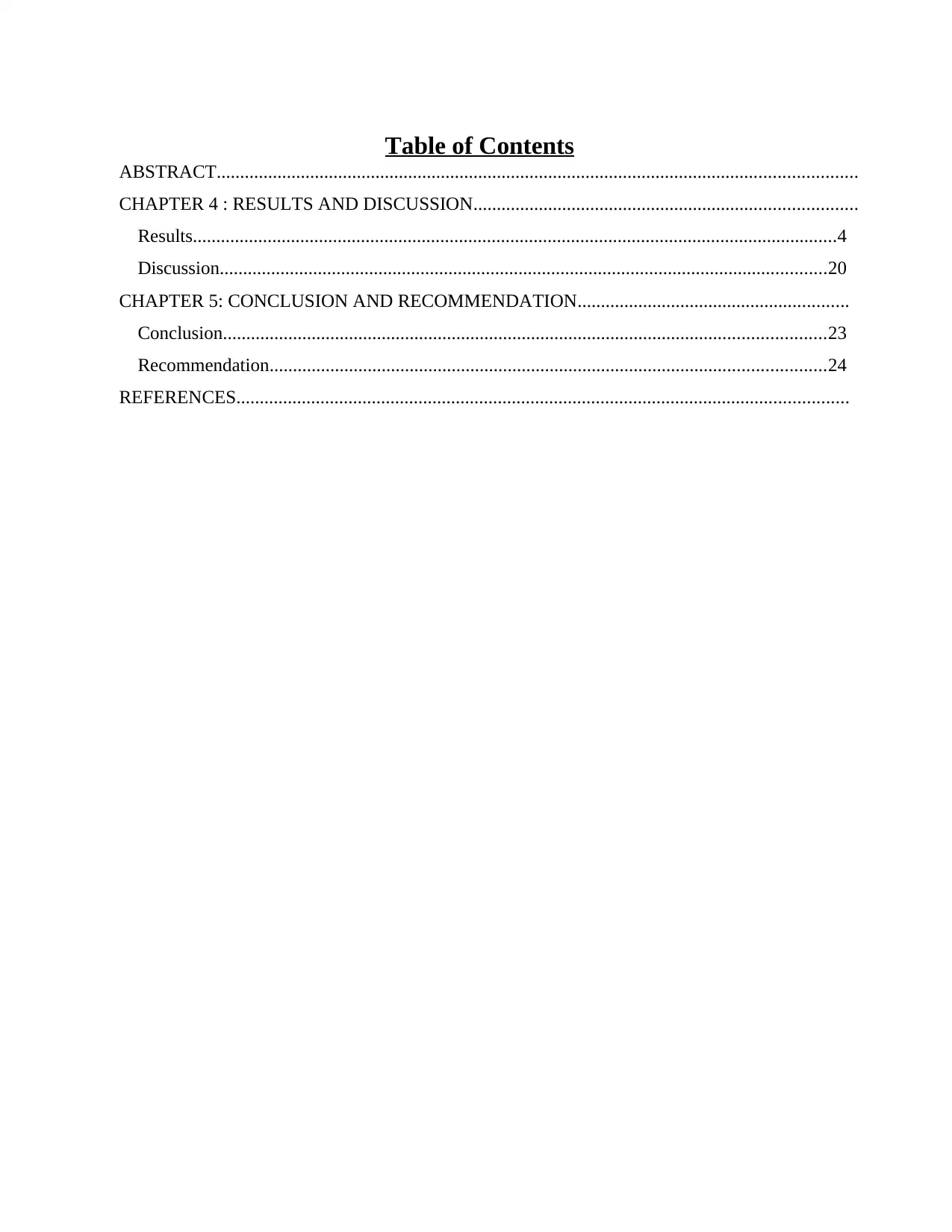
Table of Contents
ABSTRACT.........................................................................................................................................
CHAPTER 4 : RESULTS AND DISCUSSION..................................................................................
Results..........................................................................................................................................4
Discussion..................................................................................................................................20
CHAPTER 5: CONCLUSION AND RECOMMENDATION..........................................................
Conclusion.................................................................................................................................23
Recommendation.......................................................................................................................24
REFERENCES...................................................................................................................................
ABSTRACT.........................................................................................................................................
CHAPTER 4 : RESULTS AND DISCUSSION..................................................................................
Results..........................................................................................................................................4
Discussion..................................................................................................................................20
CHAPTER 5: CONCLUSION AND RECOMMENDATION..........................................................
Conclusion.................................................................................................................................23
Recommendation.......................................................................................................................24
REFERENCES...................................................................................................................................
⊘ This is a preview!⊘
Do you want full access?
Subscribe today to unlock all pages.

Trusted by 1+ million students worldwide
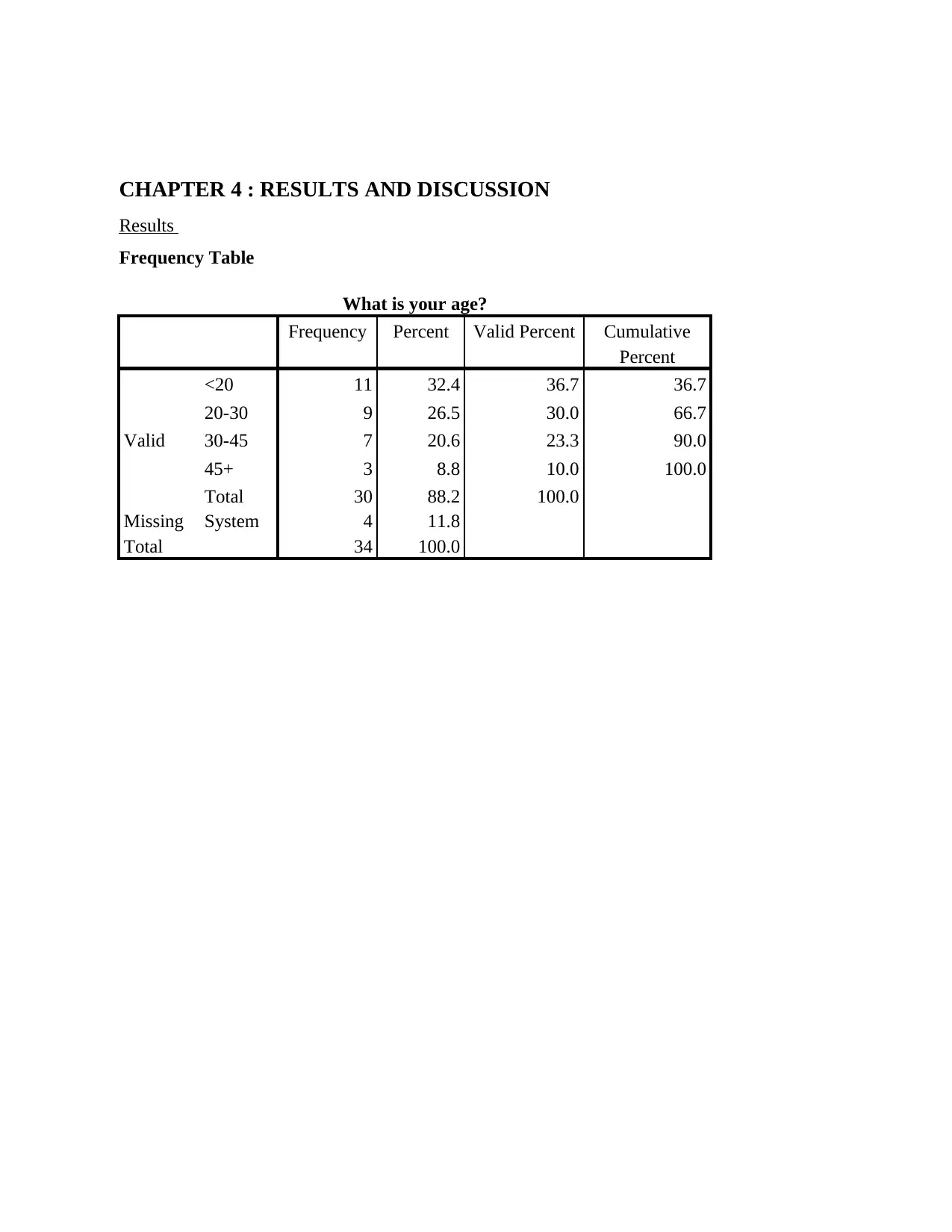
CHAPTER 4 : RESULTS AND DISCUSSION
Results
Frequency Table
What is your age?
Frequency Percent Valid Percent Cumulative
Percent
Valid
<20 11 32.4 36.7 36.7
20-30 9 26.5 30.0 66.7
30-45 7 20.6 23.3 90.0
45+ 3 8.8 10.0 100.0
Total 30 88.2 100.0
Missing System 4 11.8
Total 34 100.0
Results
Frequency Table
What is your age?
Frequency Percent Valid Percent Cumulative
Percent
Valid
<20 11 32.4 36.7 36.7
20-30 9 26.5 30.0 66.7
30-45 7 20.6 23.3 90.0
45+ 3 8.8 10.0 100.0
Total 30 88.2 100.0
Missing System 4 11.8
Total 34 100.0
Paraphrase This Document
Need a fresh take? Get an instant paraphrase of this document with our AI Paraphraser
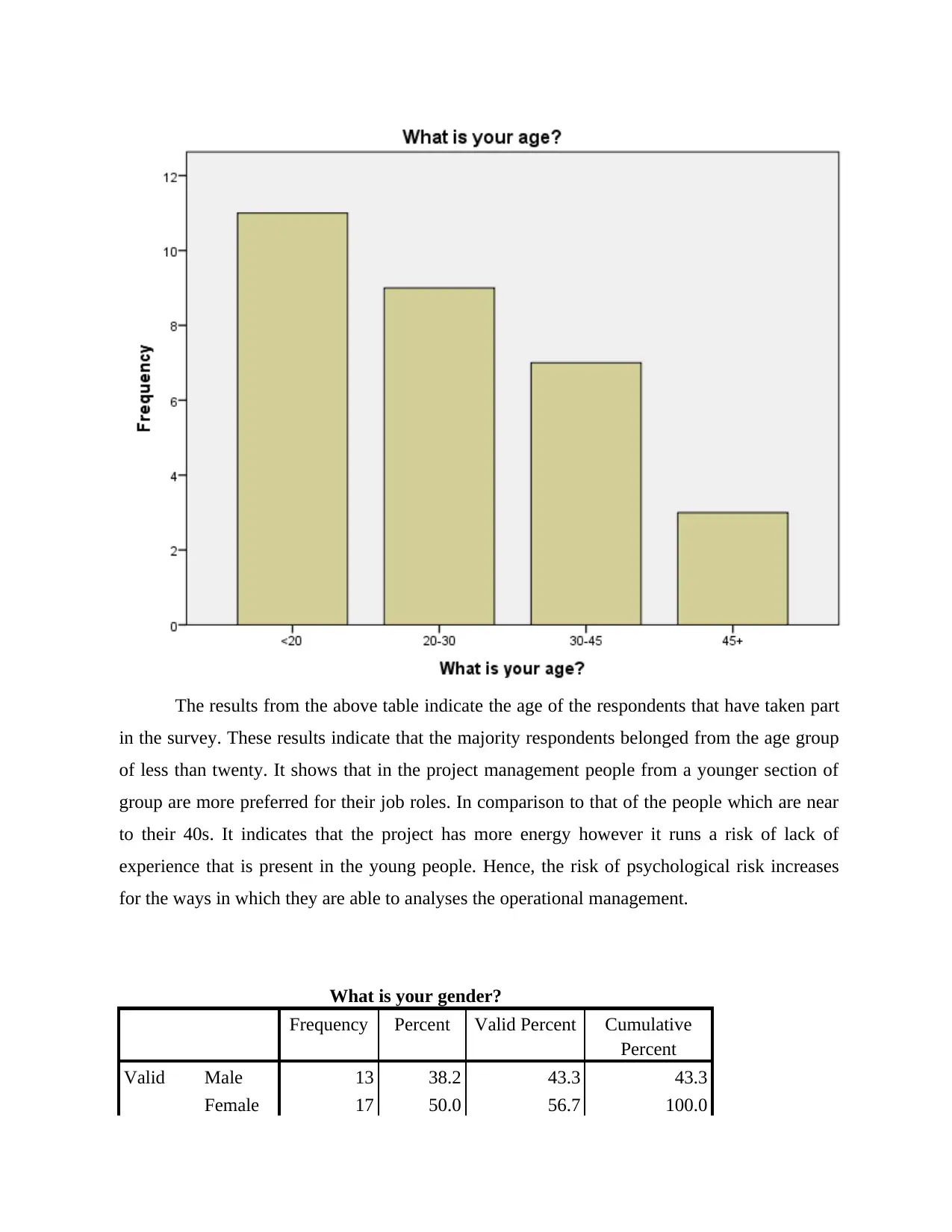
The results from the above table indicate the age of the respondents that have taken part
in the survey. These results indicate that the majority respondents belonged from the age group
of less than twenty. It shows that in the project management people from a younger section of
group are more preferred for their job roles. In comparison to that of the people which are near
to their 40s. It indicates that the project has more energy however it runs a risk of lack of
experience that is present in the young people. Hence, the risk of psychological risk increases
for the ways in which they are able to analyses the operational management.
What is your gender?
Frequency Percent Valid Percent Cumulative
Percent
Valid Male 13 38.2 43.3 43.3
Female 17 50.0 56.7 100.0
in the survey. These results indicate that the majority respondents belonged from the age group
of less than twenty. It shows that in the project management people from a younger section of
group are more preferred for their job roles. In comparison to that of the people which are near
to their 40s. It indicates that the project has more energy however it runs a risk of lack of
experience that is present in the young people. Hence, the risk of psychological risk increases
for the ways in which they are able to analyses the operational management.
What is your gender?
Frequency Percent Valid Percent Cumulative
Percent
Valid Male 13 38.2 43.3 43.3
Female 17 50.0 56.7 100.0
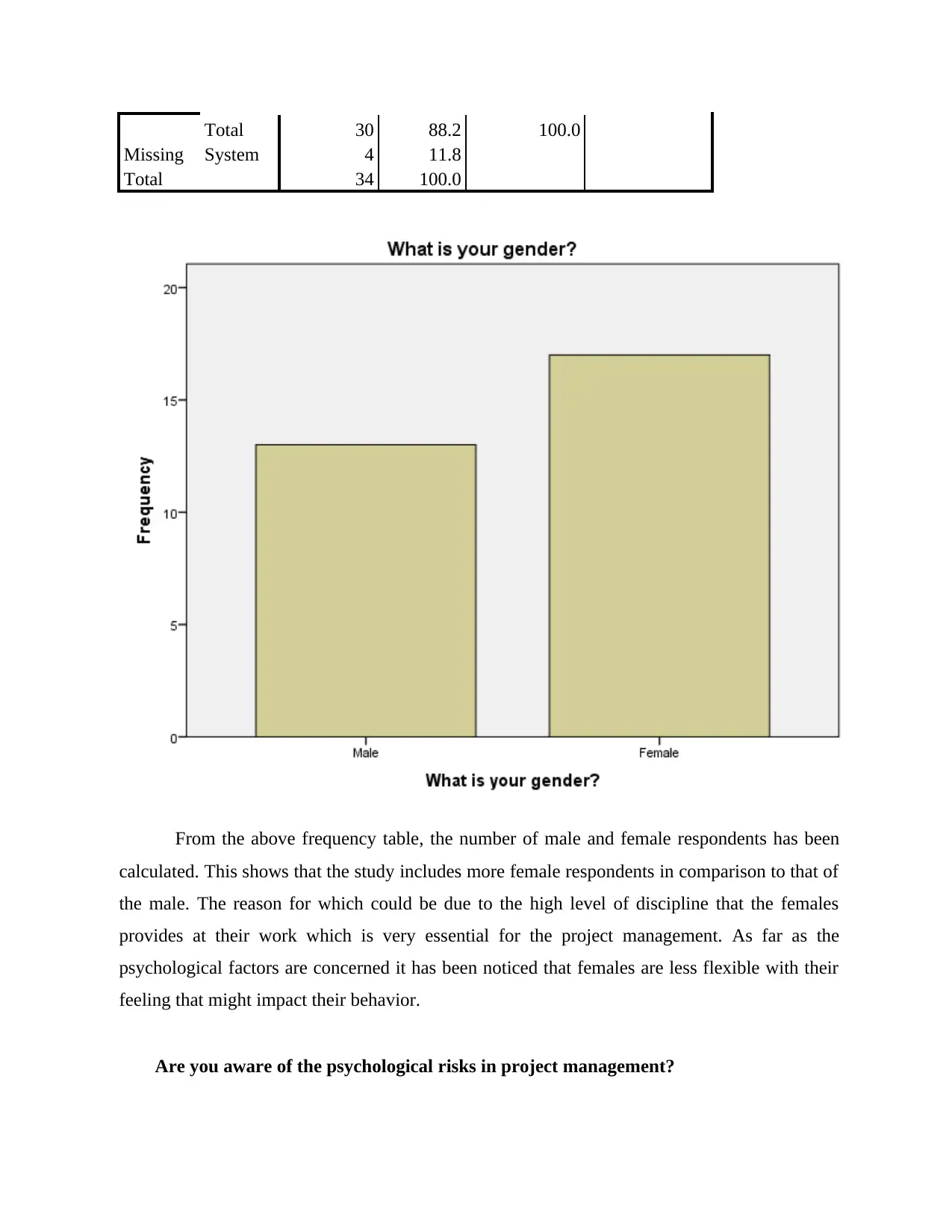
Total 30 88.2 100.0
Missing System 4 11.8
Total 34 100.0
From the above frequency table, the number of male and female respondents has been
calculated. This shows that the study includes more female respondents in comparison to that of
the male. The reason for which could be due to the high level of discipline that the females
provides at their work which is very essential for the project management. As far as the
psychological factors are concerned it has been noticed that females are less flexible with their
feeling that might impact their behavior.
Are you aware of the psychological risks in project management?
Missing System 4 11.8
Total 34 100.0
From the above frequency table, the number of male and female respondents has been
calculated. This shows that the study includes more female respondents in comparison to that of
the male. The reason for which could be due to the high level of discipline that the females
provides at their work which is very essential for the project management. As far as the
psychological factors are concerned it has been noticed that females are less flexible with their
feeling that might impact their behavior.
Are you aware of the psychological risks in project management?
⊘ This is a preview!⊘
Do you want full access?
Subscribe today to unlock all pages.

Trusted by 1+ million students worldwide
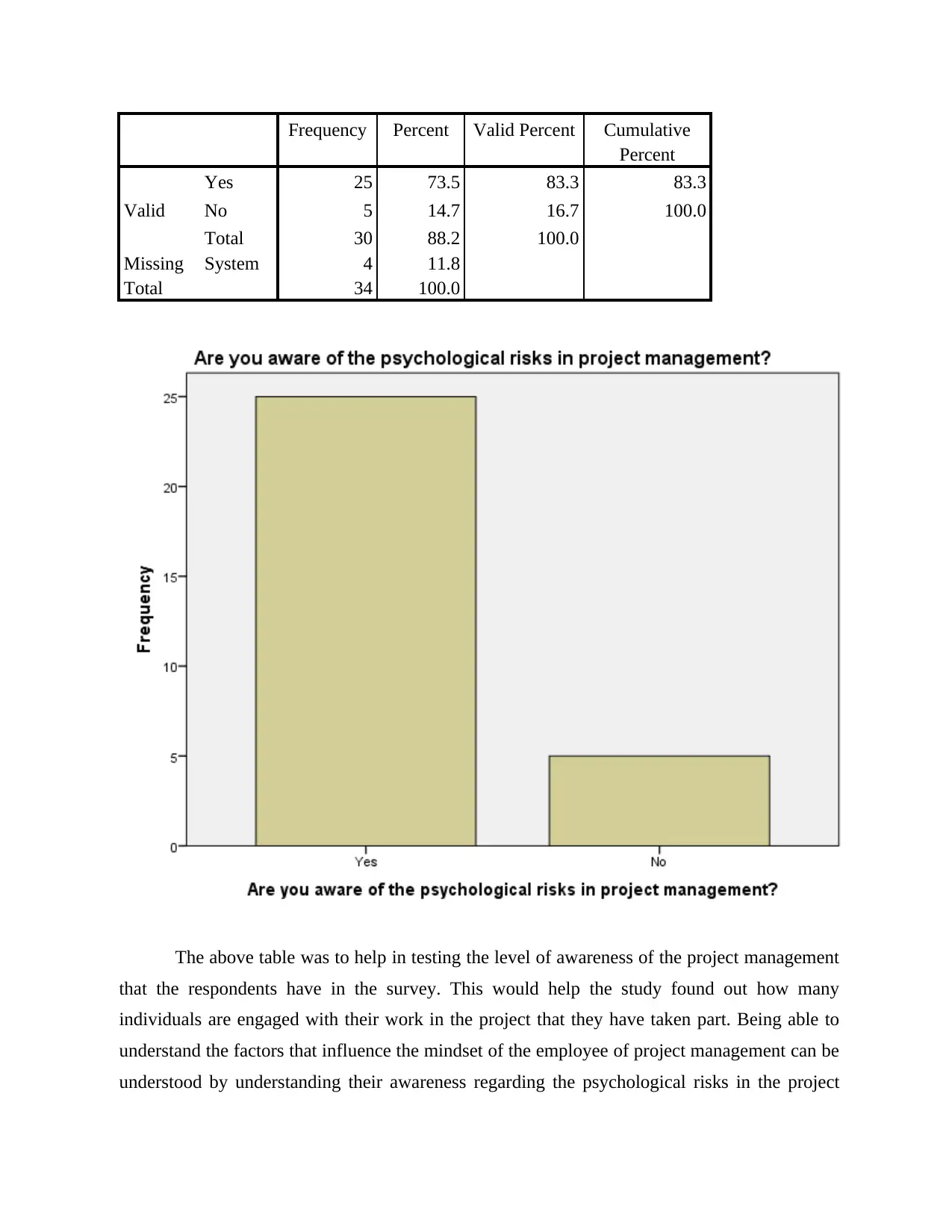
Frequency Percent Valid Percent Cumulative
Percent
Valid
Yes 25 73.5 83.3 83.3
No 5 14.7 16.7 100.0
Total 30 88.2 100.0
Missing System 4 11.8
Total 34 100.0
The above table was to help in testing the level of awareness of the project management
that the respondents have in the survey. This would help the study found out how many
individuals are engaged with their work in the project that they have taken part. Being able to
understand the factors that influence the mindset of the employee of project management can be
understood by understanding their awareness regarding the psychological risks in the project
Percent
Valid
Yes 25 73.5 83.3 83.3
No 5 14.7 16.7 100.0
Total 30 88.2 100.0
Missing System 4 11.8
Total 34 100.0
The above table was to help in testing the level of awareness of the project management
that the respondents have in the survey. This would help the study found out how many
individuals are engaged with their work in the project that they have taken part. Being able to
understand the factors that influence the mindset of the employee of project management can be
understood by understanding their awareness regarding the psychological risks in the project
Paraphrase This Document
Need a fresh take? Get an instant paraphrase of this document with our AI Paraphraser
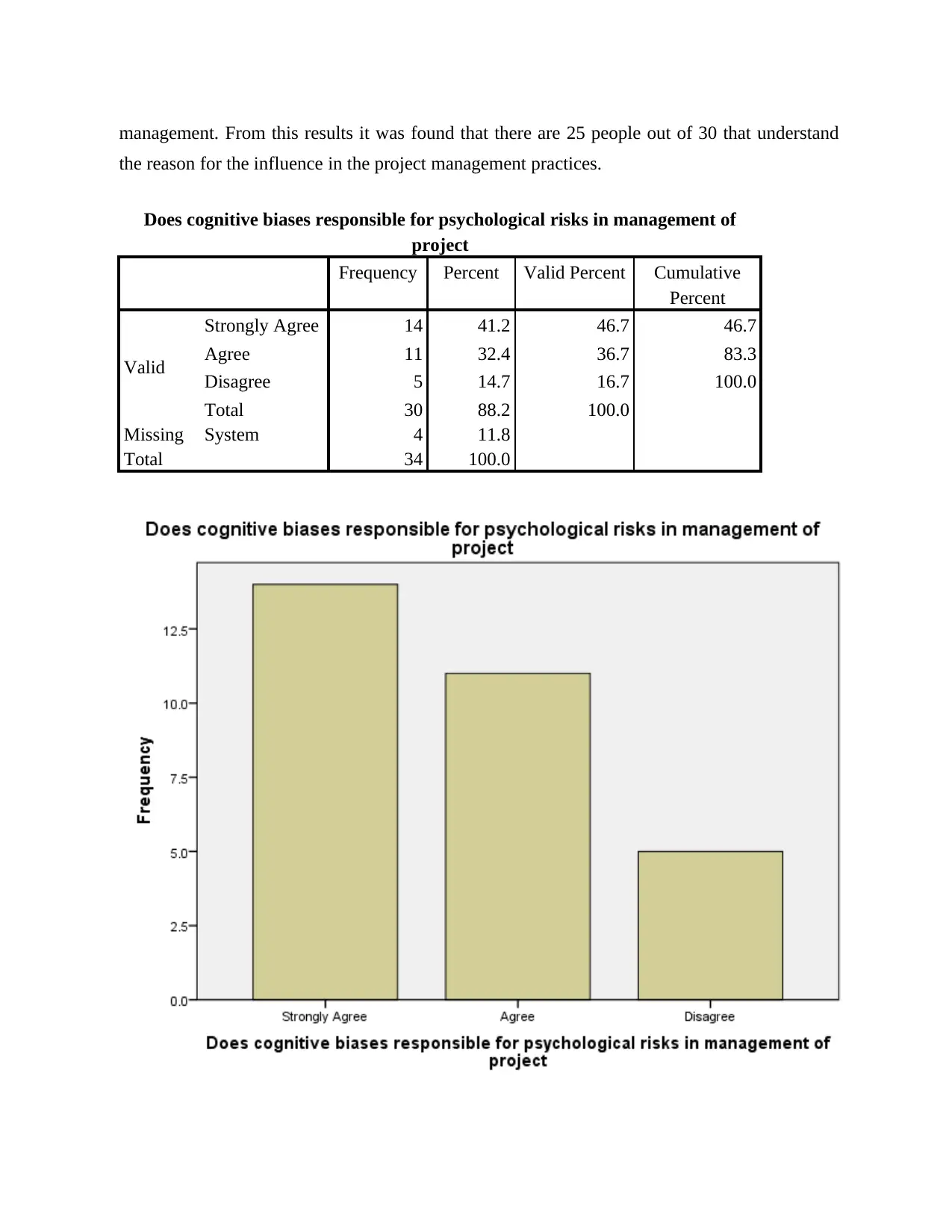
management. From this results it was found that there are 25 people out of 30 that understand
the reason for the influence in the project management practices.
Does cognitive biases responsible for psychological risks in management of
project
Frequency Percent Valid Percent Cumulative
Percent
Valid
Strongly Agree 14 41.2 46.7 46.7
Agree 11 32.4 36.7 83.3
Disagree 5 14.7 16.7 100.0
Total 30 88.2 100.0
Missing System 4 11.8
Total 34 100.0
the reason for the influence in the project management practices.
Does cognitive biases responsible for psychological risks in management of
project
Frequency Percent Valid Percent Cumulative
Percent
Valid
Strongly Agree 14 41.2 46.7 46.7
Agree 11 32.4 36.7 83.3
Disagree 5 14.7 16.7 100.0
Total 30 88.2 100.0
Missing System 4 11.8
Total 34 100.0
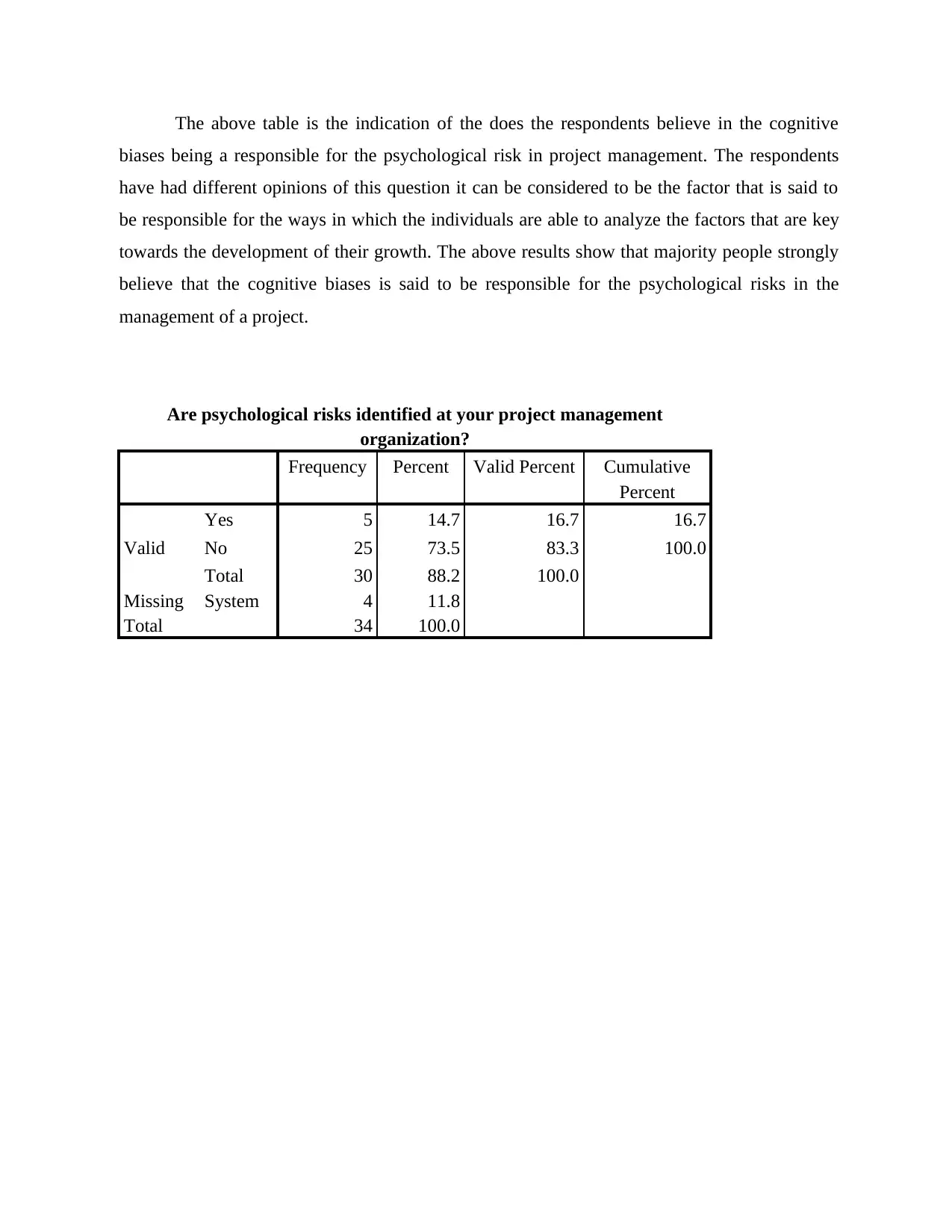
The above table is the indication of the does the respondents believe in the cognitive
biases being a responsible for the psychological risk in project management. The respondents
have had different opinions of this question it can be considered to be the factor that is said to
be responsible for the ways in which the individuals are able to analyze the factors that are key
towards the development of their growth. The above results show that majority people strongly
believe that the cognitive biases is said to be responsible for the psychological risks in the
management of a project.
Are psychological risks identified at your project management
organization?
Frequency Percent Valid Percent Cumulative
Percent
Valid
Yes 5 14.7 16.7 16.7
No 25 73.5 83.3 100.0
Total 30 88.2 100.0
Missing System 4 11.8
Total 34 100.0
biases being a responsible for the psychological risk in project management. The respondents
have had different opinions of this question it can be considered to be the factor that is said to
be responsible for the ways in which the individuals are able to analyze the factors that are key
towards the development of their growth. The above results show that majority people strongly
believe that the cognitive biases is said to be responsible for the psychological risks in the
management of a project.
Are psychological risks identified at your project management
organization?
Frequency Percent Valid Percent Cumulative
Percent
Valid
Yes 5 14.7 16.7 16.7
No 25 73.5 83.3 100.0
Total 30 88.2 100.0
Missing System 4 11.8
Total 34 100.0
⊘ This is a preview!⊘
Do you want full access?
Subscribe today to unlock all pages.

Trusted by 1+ million students worldwide
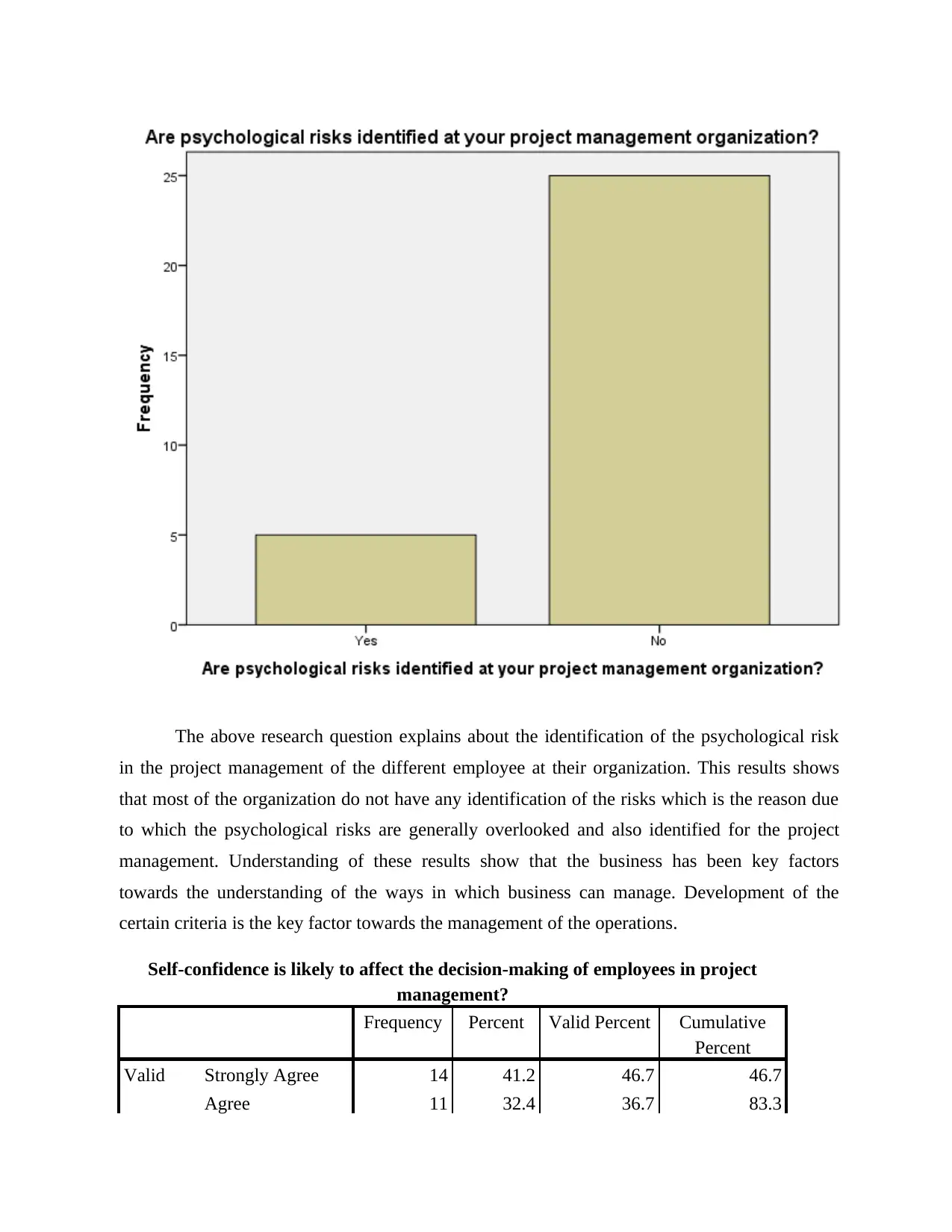
The above research question explains about the identification of the psychological risk
in the project management of the different employee at their organization. This results shows
that most of the organization do not have any identification of the risks which is the reason due
to which the psychological risks are generally overlooked and also identified for the project
management. Understanding of these results show that the business has been key factors
towards the understanding of the ways in which business can manage. Development of the
certain criteria is the key factor towards the management of the operations.
Self-confidence is likely to affect the decision-making of employees in project
management?
Frequency Percent Valid Percent Cumulative
Percent
Valid Strongly Agree 14 41.2 46.7 46.7
Agree 11 32.4 36.7 83.3
in the project management of the different employee at their organization. This results shows
that most of the organization do not have any identification of the risks which is the reason due
to which the psychological risks are generally overlooked and also identified for the project
management. Understanding of these results show that the business has been key factors
towards the understanding of the ways in which business can manage. Development of the
certain criteria is the key factor towards the management of the operations.
Self-confidence is likely to affect the decision-making of employees in project
management?
Frequency Percent Valid Percent Cumulative
Percent
Valid Strongly Agree 14 41.2 46.7 46.7
Agree 11 32.4 36.7 83.3
Paraphrase This Document
Need a fresh take? Get an instant paraphrase of this document with our AI Paraphraser
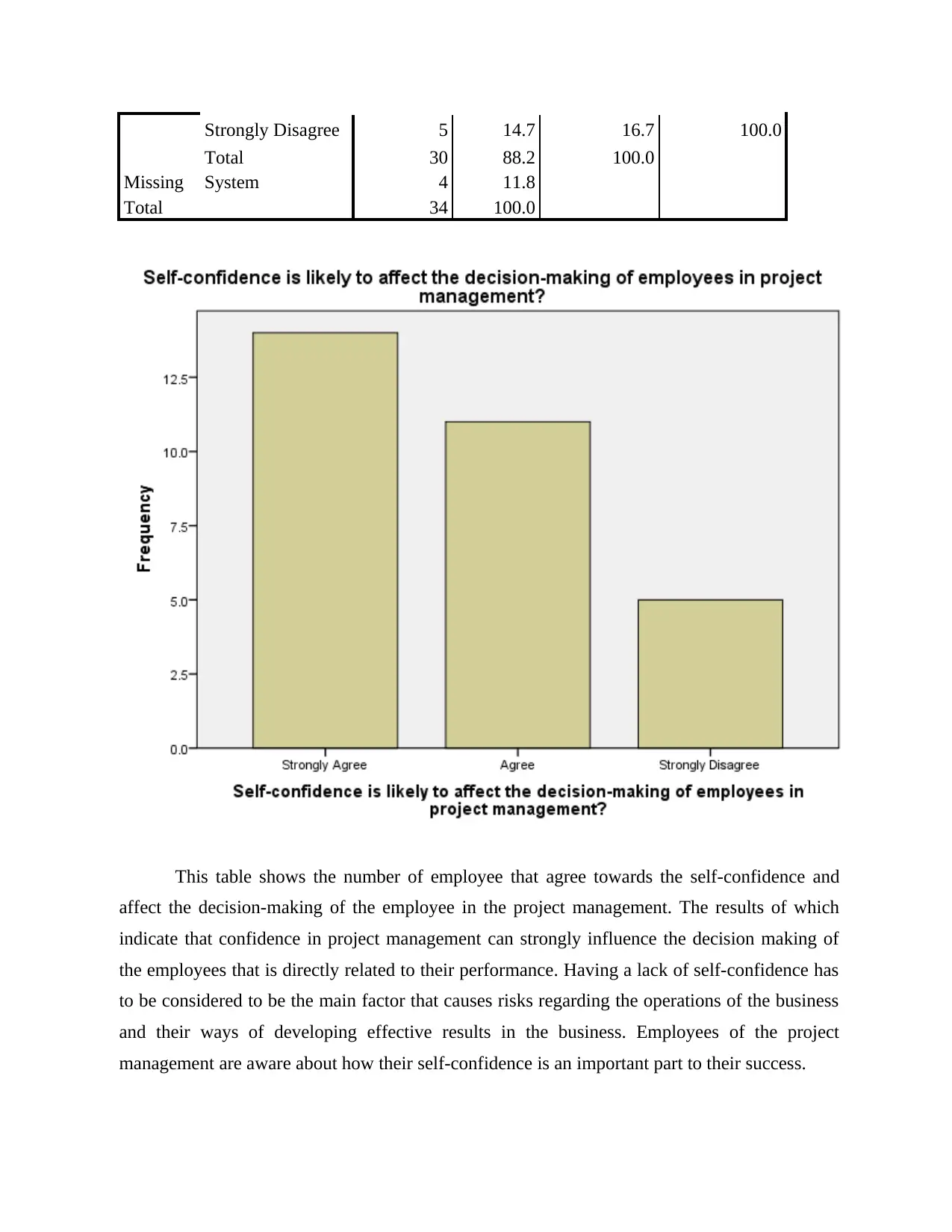
Strongly Disagree 5 14.7 16.7 100.0
Total 30 88.2 100.0
Missing System 4 11.8
Total 34 100.0
This table shows the number of employee that agree towards the self-confidence and
affect the decision-making of the employee in the project management. The results of which
indicate that confidence in project management can strongly influence the decision making of
the employees that is directly related to their performance. Having a lack of self-confidence has
to be considered to be the main factor that causes risks regarding the operations of the business
and their ways of developing effective results in the business. Employees of the project
management are aware about how their self-confidence is an important part to their success.
Total 30 88.2 100.0
Missing System 4 11.8
Total 34 100.0
This table shows the number of employee that agree towards the self-confidence and
affect the decision-making of the employee in the project management. The results of which
indicate that confidence in project management can strongly influence the decision making of
the employees that is directly related to their performance. Having a lack of self-confidence has
to be considered to be the main factor that causes risks regarding the operations of the business
and their ways of developing effective results in the business. Employees of the project
management are aware about how their self-confidence is an important part to their success.
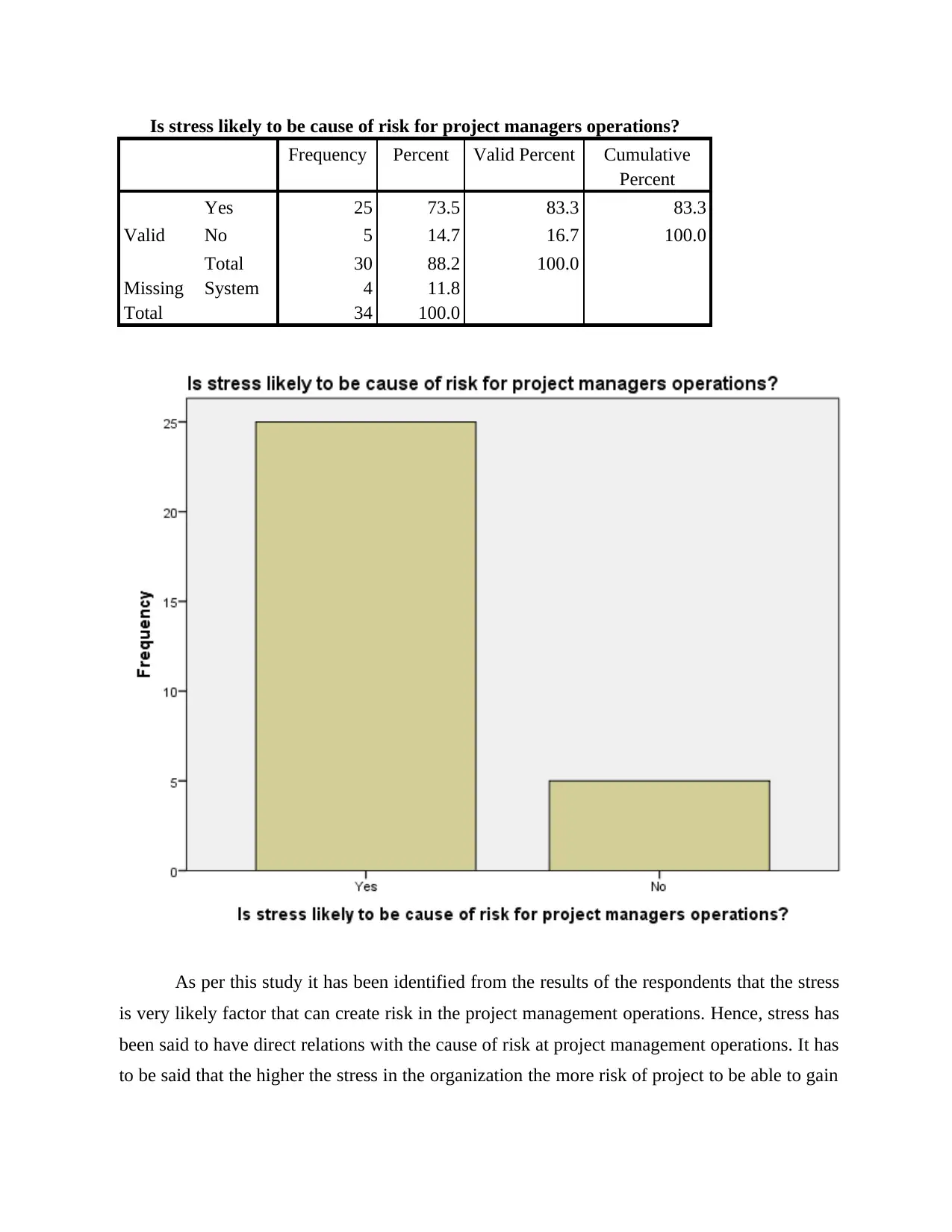
Is stress likely to be cause of risk for project managers operations?
Frequency Percent Valid Percent Cumulative
Percent
Valid
Yes 25 73.5 83.3 83.3
No 5 14.7 16.7 100.0
Total 30 88.2 100.0
Missing System 4 11.8
Total 34 100.0
As per this study it has been identified from the results of the respondents that the stress
is very likely factor that can create risk in the project management operations. Hence, stress has
been said to have direct relations with the cause of risk at project management operations. It has
to be said that the higher the stress in the organization the more risk of project to be able to gain
Frequency Percent Valid Percent Cumulative
Percent
Valid
Yes 25 73.5 83.3 83.3
No 5 14.7 16.7 100.0
Total 30 88.2 100.0
Missing System 4 11.8
Total 34 100.0
As per this study it has been identified from the results of the respondents that the stress
is very likely factor that can create risk in the project management operations. Hence, stress has
been said to have direct relations with the cause of risk at project management operations. It has
to be said that the higher the stress in the organization the more risk of project to be able to gain
⊘ This is a preview!⊘
Do you want full access?
Subscribe today to unlock all pages.

Trusted by 1+ million students worldwide
1 out of 30
Related Documents
Your All-in-One AI-Powered Toolkit for Academic Success.
+13062052269
info@desklib.com
Available 24*7 on WhatsApp / Email
![[object Object]](/_next/static/media/star-bottom.7253800d.svg)
Unlock your academic potential
Copyright © 2020–2026 A2Z Services. All Rights Reserved. Developed and managed by ZUCOL.





